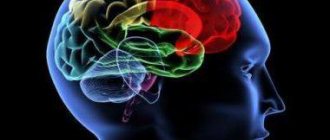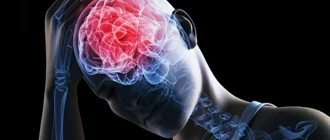Senile dementia is a syndrome that develops after age 65 and gradually progresses. A person’s mental abilities weaken, memory impairment develops, knowledge decreases, skills and activity are lost, judgment is impaired, and emotional impoverishment occurs. At the final stage of the disease, personality degradation occurs.
Neurologists at the Yusupov Hospital use the latest diagnostic methods to detect dementia at an early stage. Doctors at the neurology clinic provide complex therapy aimed at preventing the progression of disease symptoms and personality disintegration. Rehabilitation clinic specialists use innovative methods of rehabilitation therapy.
Causes
Scientists have not yet established the exact cause of the development of senile dementia. The brain processes that cause dementia are not the result of natural aging. Neurologists identify the following causes of senile dementia:
- Compounded heredity - the disease more often develops in people whose relatives suffered from dementia in old age;
- Autoimmune reactions - age-related changes in the body activate autoimmune processes in the human body, which negatively affect nerve cells and destroy the structure of neurons in the brain;
- Concomitant somatic pathology - senile dementia develops more quickly against the background of cerebral atherosclerosis, acute cerebrovascular accident or frequent transient ischemic attacks, diabetes mellitus, arterial hypertension;
- Oncological pathology - space-occupying formations compress the structures of the brain, causing the development of symptoms of dementia:
- Intoxication – smoking and alcohol abuse;
- Suffered traumatic brain injuries;
- Chronic stress.
Diseases that can cause dementia include Alzheimer's disease, Parkinson's disease, acquired immunodeficiency syndrome, Creutzfeldt-Jakob disease (dystrophic disease of the basal ganglia and cerebral cortex, spinal cord), Gaye-Wernicke-Korsakoff syndrome (damage to the hypothalamus and midbrain due to vitamin B1 deficiency). Dementia develops in patients suffering from Pick's disease (a disease of the central nervous system, which is characterized by destruction and atrophy of the cerebral cortex), neurosyphilis, and multiple sclerosis.
Dementia of the brain is a consequence of the disease. Timely examination and treatment of pathology in some cases helps prevent the development of dementia. At the Yusupov Hospital, patients receive a full range of services, including prevention, diagnostics, outpatient care, inpatient treatment and subsequent rehabilitation.
Expert opinion
Author: Polina Yuryevna Vakhromeeva
Neurologist
Dementia is often called “senile dementia,” but this is not always true. Although in the case of senile dementia, the main factor is age. The disease develops very slowly, so in the first stages only the patient himself can notice the changes. It is worth paying attention to such disorders as memory loss, tremors, changes in gait, muscle atrophy, and changes in character.
The average age of life is increasing, and, accordingly, more and more people are suffering from dementia of various types. Almost 50 million people worldwide have been diagnosed with the disease. According to WHO, in 40 years the number of people with dementia will triple!
Dementia is a multi-etiological disease. The most common cause is Alzheimer's disease. Less than 1% of cases of Alzheimer's disease are officially registered, and only 5% of them receive treatment, and this treatment is not at the expense of the state (only 10-15% of expenses are financed).
In our country, the system of care for such patients is just beginning to develop. Currently, there are many drugs that can significantly improve the condition of patients and their quality of life. It is important to remember: the sooner you contact specialists, the higher the likelihood of slowing down the course of the disease.
Causes of senile dementia
The causes of the disease are not fully understood, but it is known that a number of factors influence its development:
- unfavorable heredity;
- disruption of the immune system;
- somatic diseases, for example, atherosclerosis;
- infectious diseases, such as encephalitis or meningitis;
- various types of intoxication;
- oncological diseases;
- mental illness;
- traumatic brain injury and brain surgery;
- stress, overwork, psychological trauma, nervous shock, etc.
Stages
The clinical picture of senile dementia is determined by the degree of brain damage. In the initial stage of the disease, the patient’s intelligence and ability to work decrease, and the skills of generating ideas and time planning are lost. Patients have difficulty making decisions. They develop distrust of others, paranoia, and difficulties in doing everyday work.
In the second stage of senile dementia, the patient's intellectual abilities disappear. A person loses basic skills in using surrounding objects. He may unintentionally cause harm to himself and his home. At this stage of dementia, the sick person should not be left alone. However, he retains his self-care skills.
At the third stage of senile dementia, a person needs constant supervision. He loses personal hygiene skills and becomes unable to take care of himself.
Development of senile dementia
Senile dementia develops unpredictably, but the younger the patient, the faster the disease usually progresses. All stages can pass in either 6 months or 10 years.
Stages of senile dementia
- Initial
. Mental and mental activity decreases: memory problems appear, the patient remembers new information worse, and cannot think logically. But at the same time, he can fully serve himself and retains the ability to self-criticize. This stage is also characterized by the strengthening of certain character traits, for example, if it has always been important for a person to keep his house clean, he may begin to clean several times a day. - Moderate.
The disorders progress, patients lose interest in what was once important to them, lose the ability to independently care for themselves and perform some household tasks. Due to memory problems, a person may forget to close the door, turn off the stove, or cannot pay for purchases at the checkout. The emotional state of the patient is also disturbed, he becomes more selfish and callous, and practically does not show emotions. But he can still perform some simple actions, such as washing and dressing. - Heavy.
The patient completely loses the ability to care for himself, his memory deteriorates so much that he ceases to recognize his family and friends.
Symptoms of senile dementia
- Memory disorders.
First of all, new information and new skills are forgotten, and short-term memory suffers. As the disease progresses, the number of disturbances increases; the patient may forget his name, important facts of his life, his friends and relatives. - Loss of orientation in time.
Patients may perceive themselves as young and behave according to this age, for the same reason they do not recognize themselves in the mirror. They confuse those around them with people who were with them at one time or another. In some cases, patients begin to idealize the past, and events occurring in the present may be considered not worthy of attention. - Insomnia.
Patients cannot sleep and try to fill the time by doing some housework, for example, they can start cooking or even rearranging. - State of alarm.
Patients feel that they are being robbed, killed (including relatives), and are being pursued by strangers. With these complaints, they can seek help from passers-by or the police. In an attempt to protect himself from relatives, whom the patient takes for enemies, he may run away from home or hide all his valuables in a safe place both at home and on the street, and then forget about it. - Emotional instability.
In the initial stages of the disease, patients may experience sudden mood swings, although irritability and stubbornness are most characteristic of the disease. In the final stages, they most often become indifferent to everything, even to the state of health of their loved ones. The emotional range decreases: people can constantly be in only one emotional state. - High suggestibility.
Patients believe everything they hear. - Strengthening character traits.
For example, people who are inclined to save money become openly greedy, hoard unnecessary things, and blame others for unnecessary spending. - Various diseases and pathologies.
Most often these are high blood pressure, cataracts, baldness, disturbances in facial expressions, gait, tremors, etc.
Treatment
The diagnosis of “senile dementia” is made by doctors at the neurology clinic based on the characteristic clinical picture of the disease and computed tomography data. Treatment is performed by neurologists, psychiatrists and rehabilitation specialists. Its goal is to alleviate the patient's condition.
At the Yusupov Hospital, doctors apply international standards of dementia treatment. At the same time, neurologists take an individual approach to choosing a treatment method for each patient. Doctors at the neurology clinic treat the disease that causes senile dementia. Rehabilitation clinic specialists conduct individual and group classes aimed at restoring the patient’s independence skills, provide massage, and conduct physical therapy sessions. Specialists provide psychological support to the patient’s relatives and teach them how to care for the patient.
If rehabilitation is carried out at home, people caring for the patient receive round-the-clock support from specialists at the Yusupov Hospital by telephone. If necessary, the patient can be placed in a comfortable hospice room. To get advice from a neurologist, call the Yusupov Hospital contact center at any time of the day, regardless of the day of the week.
Make an appointment
Symptoms of brain degradation.
Brain degradation manifests itself in the following symptoms:
- Cannot concentrate on his main activity for a long time.
Brain degradation begins with an inability to concentrate.
For example, a schoolchild cannot concentrate on doing his homework. At the same time he looks at his notebook. and on a tablet with a cartoon. An adult cannot read more than one page of a book. Because something constantly distracts him or diverts his attention to another object. He rarely finishes things. - Memory is severely weakened. A person complains that his memory is failing. He cannot find the right words in his speech. Can't learn a poem. His speech becomes word-poor and monotonous. He is only interested in topics where he doesn’t have to think. Conversations are primitive.
- Constantly watches TV shows or surfs the Internet.
Brain degradation begins with using every minute to talk
or constantly calling on the phone. Doesn't give himself a chance to relax.
Causes of brain degradation.
There are many reasons for brain degradation, the main reason is our ignorance towards our body, the desire to go with the flow thoughtlessly.
I will name a few main reasons here:
- Bad foods and drinks.
Harmful foods and drinks lead to brain degradation.
They were discussed in the article about the functions of lymph. When the lymph is contaminated, the body’s systems fail, and what is especially dangerous, the most complex and therefore most vulnerable part—the brain—fails.
- Lack of movement. Constant sitting impairs the body's cleansing abilities.
- Wrong dream. It is necessary to comply with the conditions for recovery of the body during sleep. Go to bed 2 hours before midnight, wake up at dawn. Only then will all organs have time to recover. There are people who like to go to bed long after midnight and get up almost after lunch. And although they sleep a lot, they do not restore their body and early acquire brain degradation.
- Smoking and alcohol. They weaken and even destroy connections between neurons in the brain.
Smoking gradually leads to brain degradation
Alcohol leads to brain degradation.
- General anesthesia increases the likelihood of developing senile brain decline by 35%. This is confirmed by American scientists who obtained statistics for more than 9,000 people. They also argue that both general and local anesthesia are dangerous to brain function and can lead to brain degradation. https://www.gazeta.ru/health/2013/05/31_a_5364385.shtml
- But the trend that has emerged in recent years , the incessant use of mobile phones, is especially scary due to its massive reach and epidemic It reached all people, especially schoolchildren and youth. A person will not give his brain rest for a minute. And he sits constantly, for example, with a mobile phone, computer, TV. Computer games also cleverly draw people into their networks, especially children. A person looks, reads and... immediately forgets. Why? Because the brain never rests . By analogy, try doing physical labor without rest for 16 hours straight! Your body will go on strike very soon.
It’s the same with the brain: you overloaded it, didn’t give it rest, so it stops working altogether.
Brain overload from mobile phones leads to brain degradation.
Look around you: people are walking and looking at their phones as they go. Such people are dangerous, they can push you, they can create an emergency traffic situation. This means that they have forgotten how to think.
Brain degradation - the inability to tear yourself away from the phone
Those who look at gadgets on the go have voluntarily enrolled themselves in the cohort of people with brain degradation. So now it has become very easy to distinguish them, people with brain degradation, from the general mass of people.
Constantly watching TV shows leads to brain degradation and body diseases.
I know people who can't do without TV shows. They can't even fall asleep unless the TV is on. I had a neighbor like this in a sanatorium. She couldn't do without TV at all! And even late at night I fell asleep to it. Can you imagine my torment with such a neighbor! I am disgusted by the violent programs that are being broadcast now. But as soon as I turned off the TV, she immediately woke up and turned it on again.
Constantly turned on TV leads to illness and brain degradation.
This neighbor, by the way, who called herself a doctor (!), listed to me her numerous and serious illnesses. She has so many of them that I’m even tired of listening!
I explained to her where her illness came from. From TV shows:
When she falls asleep and her consciousness turns off, this information is caught by the subconscious, which never sleeps and does not critically evaluate the information. And on TV there are almost always scenes of violence! It is possible that the 25th frame from the television program is aimed at destroying health.
The neighbor, of course, was shocked that I opened her eyes to the source of her illness. Do you think she took action? No! She has already developed too strong an addiction. Tele-Addiction to Tele-Poison. She is not being treated.
Calling on mobile phones overloads the brain.
There are people who constantly call someone. There are those who always, no matter what they are doing, always answer calls immediately. But this is sometimes very dangerous: for example, when driving a car.
Let us remember that mobile phones are a radio station, a source of powerful electromagnetic radiation that destroys the body, hearing, and brain.
Talking on the phone while walking with a child leads to a loss of emotional connection with the child and brain degradation on both sides.
The path to brain degradation in both mother and child
How often can we observe: a young mother is pushing a stroller with a child and talking to someone on the phone the entire time she is walking. Her child is neglected, she does not believe that she needs to talk to him in the first place.
Now even strollers are made so that the child in the stroller does not see the parents, and the parents do not see the child. And parents don’t understand that such a stroller degrades the brain not only of the parents, but also of the child!
When does brain degradation begin?
So, the degradation of the brain, the loss of your mind, began the moment you stopped giving your brain rest. Your brain has become constantly in touch with everyday sources of information - telephone, TV, Internet, newspapers, etc.
And it doesn’t matter whether you were forced to do this by official duties, or because you have nothing to do. The result is the same: brain degradation.
Why aren’t all the bells ringing that there is now massive brain degradation going on?
Answer: Nowadays society is ruled by money. In order to receive a lot of money from the population, it is advantageous for them to be sick and not thinking. So it’s naive to expect help from a kind uncle.
This situation is very beneficial to the ruling circles. They openly say: “Our job is to sell people not what they want , but what we need .” (CBS News President Richard Salant)
How to avoid brain degradation.
Firstly , you need to respect your mental activity, respect yourself. Do not allow extraneous thoughts, desires, or people who like to call to interfere with the process of mental activity.
Secondly, you need to improve your culture of thinking and demand that others respect your brain activity, so that no one distracts you.
Thirdly , it is necessary to take breaks from mental activity. For example, I worked at the computer for half an hour, then took a 15-minute break.
Fourthly, we must remove from ourselves the causes of brain degradation from the physical side, namely:
Wrong foods and drinks.
Inadequate sleep.
Physical inactivity is insufficient physical activity.
Alcoholic drinks, smoking, being in a smoky place.
Avoid anesthesia (both general and local). Nowadays in dentistry they use painkilling injections. The doctor does not always warn that this is dangerous - the teeth and brain are located close. But you need to know that you can ask for milder pain relief - by spraying and spraying an anesthetic.
Refusal of anesthesia will prevent brain degradation.
Fifth, learn to work concentratedly on your tasks again, without distractions. At the same time, follow the regime: work - break.
Sixth, learn poems, songs, and passages of prose from good fiction books by heart.
Results.
In this article, we looked at the symptoms, causes of brain degradation and how to avoid it.
- Symptoms appear long before a person's brain begins to deteriorate. Therefore, you need to be attentive to your surroundings and, above all, to yourself for incipient dementia, i.e. brain degradation.
- Brain degradation occurs at a particularly rapid pace when the brain is constantly connected to a source of information - TV, telephone, Internet, newspapers, when the brain has no respite.
And this connection is almost always voluntary and addictive, like a drug.
This drug addiction is difficult to treat; some believe that it cannot be treated at all.
And since this phenomenon has become widespread, a mass dullness has actually occurred.
- And it cannot be stopped with drugs. You can stop it only with a conscious attitude towards yourself - give your brain a rest, disconnect it from information. Otherwise, children, adults and youth with gadgets in their hands will turn into morons, omnivorously consuming any information, unable to distinguish truth from lies.
- You need to make it a rule: your mobile phone should be turned off when you are busy with your mental activity. You need to turn it on when you take a break from your activities; fortunately, the phone has a call alert function. I understand that many people shudder at the thought of turning off their phone. This is because they are addicted to this drug.
- And finally, learn good poems, songs by heart, and read classic books. Retell texts. It’s difficult, it’s like withdrawal from drugs, but it’s a way out of the dead end of brain degradation.
Friends, listen to the amazing song of ROBIN HEARING THE VOICE performed by the VERASA ensemble:
Alexander Tikhanovich ROBIN HEARING A VOICE
Author: Alina Taranets
Provided by SendPulse
Normal brain aging
Postmortem pathological studies indicate that brain mass gradually decreases with age.
This process begins approximately in the third or fourth decade of life. The most pronounced atrophic changes are observed in the frontal lobes of the brain, postcentral and superior temporal gyrus, and visual cortex. In these formations, the degree of neuronal loss by 70–80 years can reach 32–48%. A reflection of age-related cerebral atrophy is the expansion of the ventricular system and subarachnoid spaces, which is often detected on computed tomography (CT) or magnetic resonance imaging (MRI) of the brain in elderly people.
Significant morphological and neurochemical changes are also observed in the subcortical basal ganglia: striatum, amygdala, substantia nigra, locus coeruleus, cranial nerve nuclei in the brain stem. In the substantia nigra and locus coeruleus, by the ninth to tenth decade of life, the number of neurons decreases by 30–50% compared to the end of the second decade of life. As is known, the substantia nigra and locus coeruleus are key subcortical formations for the ascending dopaminergic and noradrenergic systems. Therefore, morphological changes in these structures lead to mild functional deficiency of these neurotransmitter systems. With age, the activity of the acetylcholinergic, GABAergic, and possibly glutamatergic neurotransmitter systems also decreases.
Aging is accompanied not only by a decrease in the number of neurons in cerebral formations key to cognitive activity, but also by changes in the functional properties of the remaining neurons. A number of studies have shown a decrease in the number of dendrites and synapses between neurons with age. Certain changes also occur in the white matter, where partial demyelination is noted, mainly in the anterior parts of the brain, and a decrease in the number of gliocytes. Atherosclerotic and arteriosclerotic changes in cerebral vessels are very common in old age, which are detected in most people over 65 years of age. It has been shown that the perforating arteries supplying blood to the basal ganglia are most affected.










